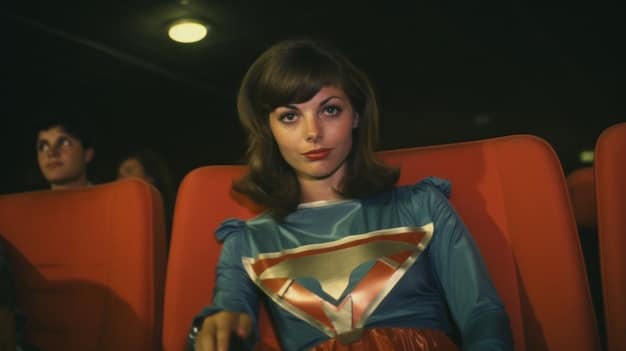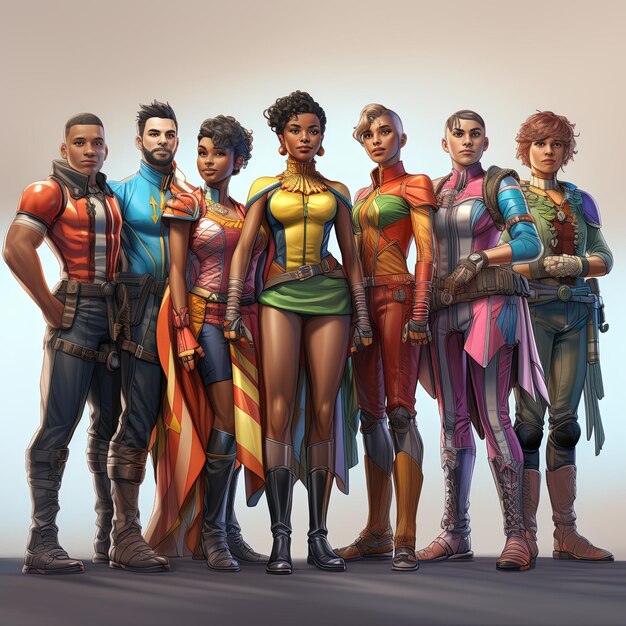Franchise Fatigue: Is Superhero Movie Mania Ending in 2025?

Franchise fatigue, particularly in superhero movies, is a growing concern as audiences potentially tire of repetitive storylines, CGI overload, and frequent reboots, raising questions about the continued dominance of the genre in 2025.
Are superhero movies losing their shine? The phenomenon of franchise fatigue: are superhero movies losing their appeal in 2025 is becoming a hot topic as moviegoers begin to question whether the endless stream of caped crusaders and cosmic battles is finally losing its luster.
Understanding Franchise Fatigue
Franchise fatigue is a term that describes the declining interest and decreasing box office returns that often plague long-running movie series. This happens when audiences feel that the franchise has become repetitive, predictable, or has simply overstayed its welcome. For superhero movies, this can manifest as weariness with origin stories, CGI-heavy action sequences, and constant reboots or retcons.
The Symptoms of Fatigue
One of the first signs of franchise fatigue is a drop in attendance. While some superhero movies continue to break records, others are seeing diminishing returns, both domestically and internationally.
Why It Happens
Several factors contribute to franchise fatigue. These include:
- Oversaturation: Too many movies and TV shows from the same franchise can overwhelm audiences.
- Repetitive Storylines: Similar plots and character arcs can make each new installment feel predictable.
- Inconsistent Quality: A decline in the quality of writing, acting, or visual effects can turn off viewers.
- Lack of Innovation: Failure to introduce new ideas or take creative risks can make a franchise feel stale.
Franchise fatigue isn’t unique to superhero movies. It’s a natural cycle that affects many long-running series. However, the sheer volume of superhero content in recent years may be accelerating the process.
The Rise of Superhero Cinema
The superhero movie genre has experienced an unprecedented boom over the past two decades, led primarily by Marvel and DC. The success of franchises like the Marvel Cinematic Universe (MCU) has reshaped the landscape of Hollywood.

With interconnected universes and a constant stream of releases, superhero movies have become a dominant force in popular culture. However, this success has also brought new challenges.
Key Players and Milestones
The first modern superhero movie was arguably Blade in 1998, which showed that there was definite interest in seeing these characters on the big screen. But it was the original Spider-Man movie in 2002 that truly turned the genre up a notch in terms of box office success and fan excitement.
- Marvel Cinematic Universe (MCU): Starting with “Iron Man” in 2008, the interconnected MCU has set a new standard for franchise building.
- DC Extended Universe (DCEU): Attempting to replicate Marvel’s success, the DCEU has had a more uneven run, with some hits and some misses.
- Standalone Successes: Movies like “The Dark Knight” trilogy have demonstrated that superhero movies can also succeed outside of shared universes.
The rise of superhero cinema has been marked by significant technological advancements, larger budgets, and a growing global audience. But as the genre continues to evolve, it faces the challenge of staying fresh and relevant.
Signs of Superhero Fatigue in 2024
In 2024, there were unmistakable signs that superhero movie audiences were beginning to feel overwhelmed. Some releases did not perform as expected, failing to reach the critical or commercial heights of previous installments.
Box Office Performance
Despite heavy marketing and strong initial hype, several superhero releases underperformed at the box office in 2024. These included:
- Lower-than-Expected Grosses: Certain movies failed to meet pre-release projections, indicating a potential decline in audience enthusiasm.
- Critical Reception: Poor reviews and negative word-of-mouth further contributed to the underwhelming performance of some films.
- Competition: The increasingly crowded release calendar means that superhero movies are competing not only with each other but with other genres as well.
In the past a superhero project was almost sure to generate revenue, but the current financial reports show the projects are falling short of their revenue marker, indicating the saturation audiences are experiencing.
Audience Reception
Audience sentiment towards superhero movies has also shifted. While hardcore fans remain dedicated, casual viewers are becoming more selective.
What Could Help Superhero Movies in 2025
To combat franchise fatigue and regain audience interest, superhero movies need to evolve.
Creative risks, stronger narratives, and character development would serve as a great starting point for moviemakers.
Fresh ideas would encourage older fans to regain interest while encouraging new fans to join the audience.

Diversifying Storylines
One way to combat fatigue is to move beyond familiar superhero tropes. This might involve:
- Exploring Different Genres: Incorporating elements of horror, mystery, or romance into superhero stories.
- Focusing on Character Development: Delving deeper into the personal lives and struggles of the characters.
- Taking Creative Risks: Experimenting with unconventional narratives and storytelling techniques.
Improving Visual Effects
While visual effects are a hallmark of superhero movies, they can also contribute to fatigue if overused. Audiences are becoming more discerning and are less impressed by spectacle alone.
The Future of Superhero Franchises
The future of superhero franchises depends on their ability to adapt and innovate. The days of guaranteed success may be over, but there is still plenty of potential for compelling superhero stories.
Long-Term Strategies
To ensure the long-term viability of superhero franchises, studios need to:
- Plan Ahead: Develop comprehensive story arcs that span multiple movies and TV shows.
- Manage Expectations: Avoid overpromising or hyping up movies excessively.
- Listen to Feedback: Pay attention to audience reactions and adjust course accordingly.
The best stories are character-driven and grounded in reality. These approaches allow the audiences to experience the projects.
A New Era of Superhero Movies
The genre is at a crossroads. It can either continue down the path of diminishing returns or reinvent itself for a new era. The key will be to prioritize quality over quantity, creativity over conformity, and substance over spectacle.
| Key Point | Brief Description |
|---|---|
| 🎬 Franchise Fatigue | Declining interest in long-running movie series due to oversaturation and repetitive content. |
| 🦸♂️ Superhero Cinema Rise | Marvel and DC’s dominance reshaped Hollywood with interconnected universes and constant releases. |
| 📉 Signs in 2024 | Underperforming box office returns and changing audience reception hinted growing disinterest. |
| ✨ Future | Adapting, innovating, and prioritizing quality over quantity for superhero franchises. |
FAQ
Franchise fatigue is the audience’s declining interest in a long-running series due to oversaturation. It results from repetitive storylines, too many reboots, and an overall lack of fresh ideas. It manifests in lower attendance and poor reviews.
Superhero movies succeeded due to the heroes’ adventures, combined with CGI technology, giving us memorable narratives. Also, Marvel and DC know how to promote these characters creating anticipation and excitement that translates into big numbers at the box office.
There are many signs that indicate fatigue. Low box office numbers, bad reviews, overexposure, and bad CGI use are a few indicators. They cause the movie to fail and the audience to distance themselves from the project.
Superhero movies can stay relevant by diversifying storylines. They can give their characters great development and take creative risks. Also, they should be less reliant on CGI, trying to focus on a character-driven and grounded-in-reality experience.
Multiple sources indicate that superhero fatigue is a real phenomenon. Signs of underperformance, bad reviews, and low numbers, along with an uninterested audience, are clear indicators that the projects are losing their appeal and are falling short of the numbers.
Conclusion
As we look to 2025, the question isn’t whether superhero movies will disappear, but how they will evolve. By addressing franchise fatigue head-on with stronger stories, better visuals, and a willingness to take risks, the genre can recapture the hearts and minds of audiences worldwide, ensuring that superheroes remain a vibrant part of our pop culture landscape.





